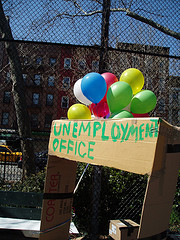The job market in its worst state since the Great Depression and is putting tremendous strain on millions of Americans. Without action from Washington, D.C., the unemployment rate will remain elevated for years to come, and almost certainly above 9 percent through the end of 2010. Public esteem for economic policymakers isn’t doing so hot either. There are several simple steps that President Barack Obama and Congress could take to create jobs, but of late, neither have shown much interest in doing so.
Jobs matter
As Tim Fernholz emphasizes for The American Prospect, one of the best opportunities to repair the job market is a piece of legislation authored by Rep. George Miller (D-CA). The bill’s strategy is straightforward: Local governments pinched by the recession can apply for federal funds to ensure that teachers, cops, and other public servants are not laid off in the name of balanced budgets. Local governments that have already let employees go could apply for funding to re-hire them.
The result would be a clear win for the economy. Miller estimates that his bill could create 750,000 jobs, while the Economic Policy Institute expects the bill could create as many as 945,000. It’s also a smart political move—Obama’s political adversaries would no doubt find some way to criticize the move (they invented death panels for health care, after all), but as Fernholz notes, voters care much more about getting back to work than they do about ideological warfare or abstract bloviations about the federal budget deficit.
The deficit vs. jobs
And the federal budget deficit is no excuse for inaction on jobs. In the middle of a recession, providing funding for jobs can ultimately be deficit-reducing. More people working means more people buying goods and services. That means higher tax receipts for the government on a variety of fronts.
The deficit only matters if it is so severe that investors are skittish about lending money to the government. We would see this nervousness in the interest rates on U.S. Treasury bonds—the rate would be very high, as investors demanded a high return for the risk they were taking on. But in fact, interest rates are very low—the interest rate on 30-year bonds is currently just over 4 percent, while it frequently eclipsed 9 percent during the presidency of George H. W. Bush.
War doesn’t improve the economy
But if lawmakers wanted to take action on the deficit, there is no reason why they should do so at the expense of jobs. Congress just approved an additional $60 billion in funding for the war in Afghanistan, while refusing to provide a $28 billion for teachers in the name of deficit reduction. Congress has officially spent $1 trillion on the wars in Afghanistan and Iraq, as Robert Greenwald notes for AlterNet, wars which have done little to improve either U.S. economic or foreign policy goals:
These wars aren’t making us safer. They aren’t worth the cost, and we don’t need them. What people do need are jobs and help when they don’t have enough work or any work at all. But instead of leading on the jobs issue, they’re delaying and dissembling about the cost– while spending trillions on war.
Indeed, the failure of Congress to take action on jobs before its Memorial Day recess means that over one million Americans will stop receiving unemployment benefits within a month’s time.
Tax time
As Art Levine emphasizes for Working In These Times, spending is only half of the budget equation. The other half is revenues, which means taxes. There are all kinds of ways that the government could responsibly raise taxes and use that money to create jobs. One political no-brainer would be requiring hedge fund mangers and private equity kingpins to pay taxes at the same rates as those of other billionaires.
Thanks to a George W. Bush-era tax cut, these Wall Street titans are taxed at rates as low as 15 percent, dramatically lower than the 35 percent tax rate for rich people who make their millions in the form of salary rather than interest on investments. Levine also details a host of jobs initiatives that were ultimately axed in favor of concerns about the deficit.
Tax the speculators
As Sarah Anderson notes for Yes! Magazine, taxing financial speculation itself could help give our economy a double jolt. By taxing risky Wall Street gambling, the government could bring in billions to spend on jobs. If that tax discouraged Wall Street traders from engaging in risky gambling, the lower levels of speculation would help insulate our economy from the kinds of shocks it received in the fall of 2008.
Come November, the top concern at the polling place will correspond closely to the top concerns of consumer pocketbooks. Tough economic times will mean losses for incumbents in both political parties, but the party that does the most to create jobs will do the most to curb its losses. It will also be pursuing responsible public policy, and advancing the well-being of its constituents.
This post features links to the best independent, progressive reporting about the economy by members of The Media Consortium. It is free to reprint. Visit the Audit for a complete list of articles on economic issues, or follow us on Twitter. And for the best progressive reporting on critical economy, environment, health care and immigration issues, check out The Mulch, The Pulse and The Diaspora. This is a project of The Media Consortium, a network of leading independent media outlets.




